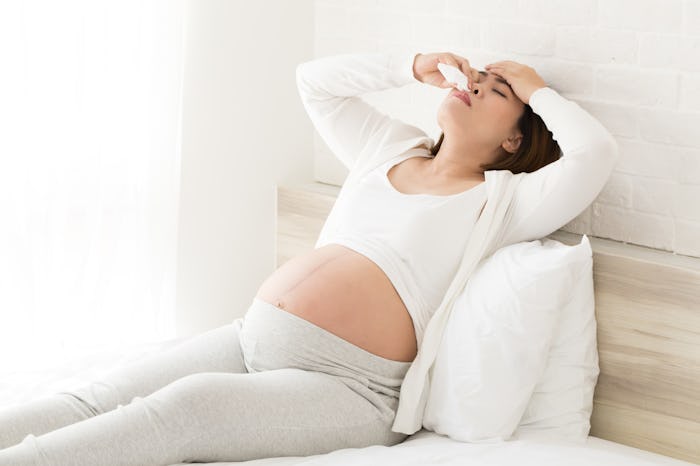Life

Here's What You Need To Know About Allergy Medicine During Pregnancy
For some people around the country, it seems like winter is never going to end. But once your eyes begin itching and you a launch a sneeze here and there, you know that spring and it’s accompanying allergies are well on their way. If you are pregnant, you might be considering reevaluating your allergy care regimen for the safety of your baby. Some drugs are supposedly safer than others during pregnancy, but can you take allergy medicine while pregnant?
In an interview with Romper, Chicago area pharmacist Bineesh Moyeed Pharm.D says that the most important thing to remember when taking any medication during pregnancy, even it is available over the counter, is that you need to get permission from your physician first. “Some oral antihistamines and nasal sprays may be prescribed by your doctor,” says Moyeed, “but if your symptoms can be managed naturally, they may ask you to avoid them altogether.” She adds that natural allergy management can include things like using saline nasal sprays or allergy proofing your bedding and home.
In a 2014 study by the Centers for Disease Control and Prevention (CDC), researchers found that while many antihistamines may not be linked to birth defects, there are a few that could potentially lead to birth defects if taken during pregnancy, but the CDC suggested that further research is still needed. For an even more confusing take, in a Boston University study published in the Journal of Allergy and Clinical Immunology, researchers concluded that antihistamines including diphenhydramine, loratadine, and doxylamine may not be associated with congenital defects as previously believed.
Moyeed says that because human research data is scarce and keeps changing, there isn’t enough solid evidence to rule out the risks allergy medicines can pose during pregnancy. She notes that some of the more common antihistamines, like fexofenidine (Allegra), loratadine (Claritin), and diphenhydramine (Benedryl) may be lower risk than others. “Any allergy medications that contain the decongestants pseudoephedrine and phenylephrine should be avoided in the first trimester," she suggests, “because there have been a few reports suggesting they are associated with birth defects.”
Every pregnancy is different, so the circumstances for every woman will vary, too. Moyeed notes that if your allergies are manageable through environmental changes, your doctor may not prescribe any medication, but if your allergies are affecting your health severely and impacting your pregnancy negatively, your doctor should be able to prescribe you an allergy treatment regimen that is appropriate for your situation. “Medications and their safety will rely wholly upon the patient and their individual case,” she explains, “so during pregnancy, a personalized and customized treatment plan should be prescribed only by an evaluating physician.”
Aside from seasonal allergies, there are other conditions that may have you reaching for an antihistamine. The American Pregnancy Association (APA) noted that common pregnancy conditions like hives and skin rashes may require treatment with allergy medications. The oral antihistamines that the APA suggested are relatively safe to use during pregnancy include Benadryl, Allegra, Claritin, Zyrtec, and Chlor-Trimeton, but they still recommend consulting your doctor first and carefully reading the ingredients list and any warning labels on the medication’s box or insert.
So if you are pregnant and suffering from one form of allergy or another, make sure to talk to your physician or healthcare team about all of your treatment options, along with any risks that you may be concerned about. I know that changing your life around to accommodate your pregnancy can be annoying, and sometimes even painful, but take comfort in remembering that your pregnancy won’t last forever. Eventually, you should be able to get back to your regular allergy treatment routine.
Check out Romper's new video series, Bearing The Motherload, where disagreeing parents from different sides of an issue sit down with a mediator and talk about how to support (and not judge) each other’s parenting perspectives. New episodes air Mondays on Facebook.